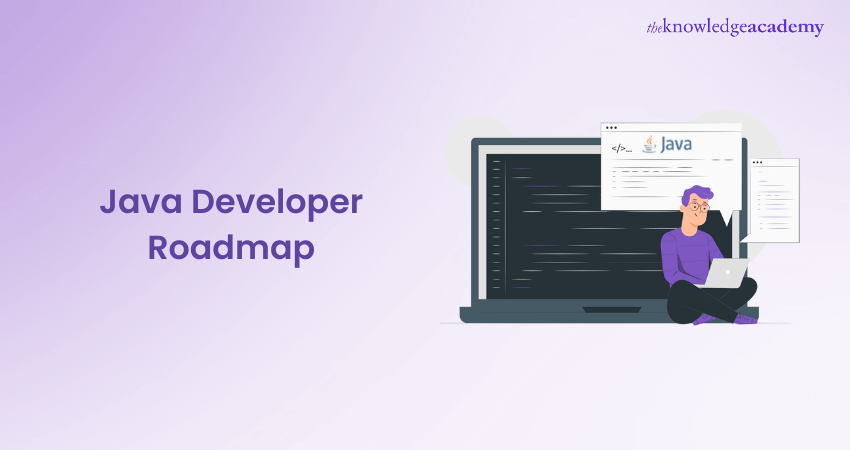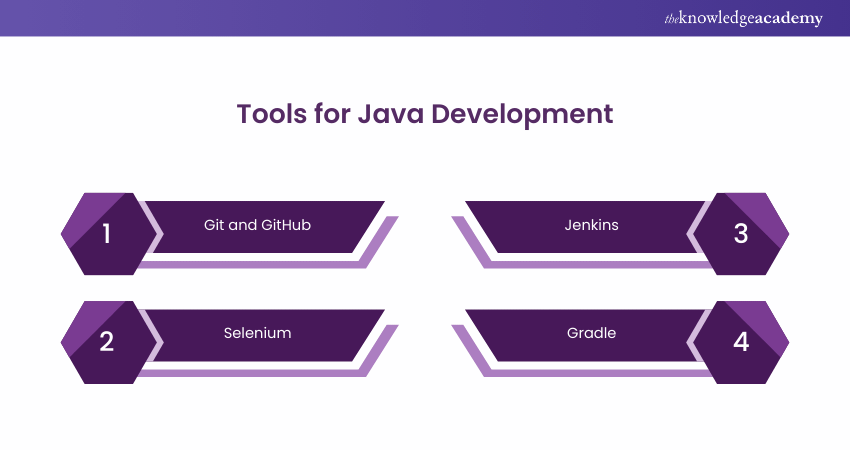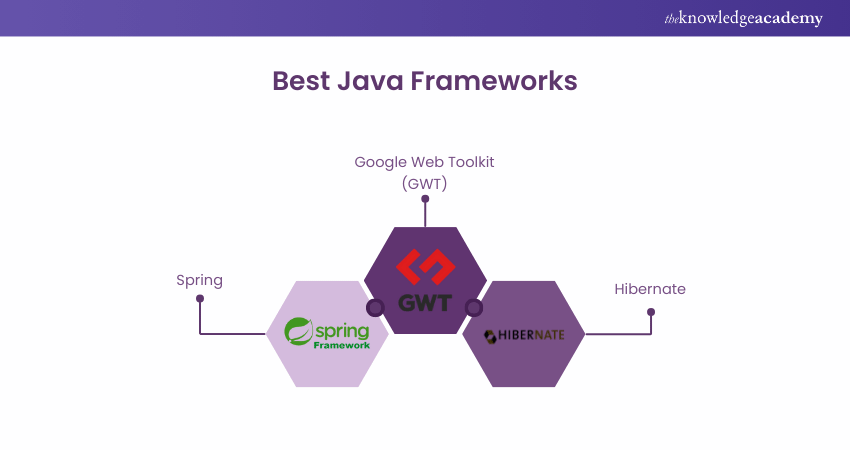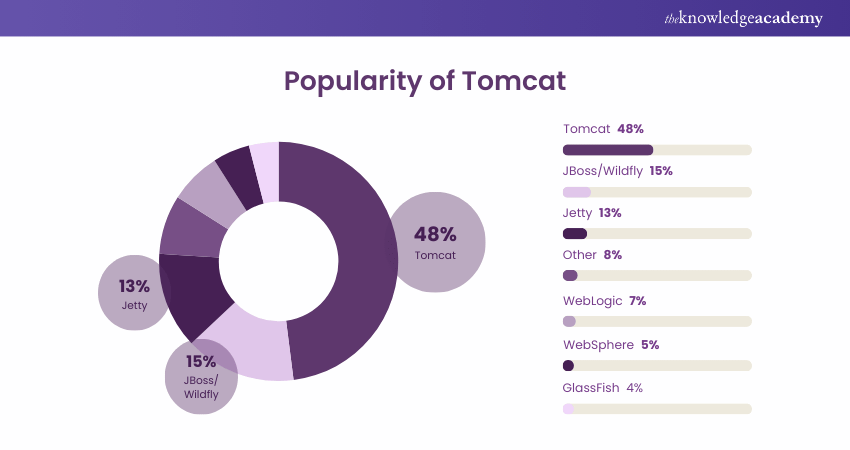We may not have the course you’re looking for. If you enquire or give us a call on 01344203999 and speak to our training experts, we may still be able to help with your training requirements.
We ensure quality, budget-alignment, and timely delivery by our expert instructors.

Java continues to be a powerhouse that runs everything from Mobile Apps to massive enterprise systems. As a result, the role of a Java Developer continues to be in high demand. But with so many tools, frameworks, and technologies available, it can be quite a jigsaw to assemble your career trajectory. But don't worry; this blog outlines the ideal Java Developer Roadmap for you to follow. It breaks down the core Java concepts, front-end and Back-End Development tools, frameworks, best practices and more. So read on and set your path to Java mastery!
Table of Contents
1) Who is a Java Developer?
2) Importance of Java
3) Java Developer Roadmap
4) Essential Skills for Java Developers
5) Top Five Tools for Java Development
6) Front-End Development Tools
7) Back-End Development Tools
8) Important Servers and Databases for Java Development
9) Is Java Highly Paid?
10) Can I Master Java in 3 Months?
11) Conclusion
Who is a Java Developer?
A Java Developer is a Software Engineer specialising in developing applications employing the Java programming language. They are responsible for writing, testing, and maintaining code while collaborating with other team members to design and implement software solutions. Java Developers typically work on Web Applications, Mobile Applications, and enterprise-level solutions.
Importance of Java
Java is invaluable to Developers as it enables them to perform the following:
1) Cross-platform Compatibility: Software created on one platform runs seamlessly on other platforms.
2) Web-based Applications: Create programs that function within web browsers.
3) Server-side Development: Build applications for online forums, e-commerce platforms, polls, and more.
4) Custom Application Integration: Combine Java-based applications for tailored solutions.
5) Embedded & Mobile Development: Develop efficient applications for mobile devices, microcontrollers, sensors, and other electronic devices.
Java Developer Roadmap
To become a proficient Java Developer, you must follow a roadmap that includes the following areas:
1) Core Java
2) Advanced Java
3) Development tools
4) Testing and debugging
5) Web Development
6) Databases
7) Deployment and DevOps
We will explore some of these areas in detail in the next section.
Want to improve your employability in the exciting world of Software Development? Sign up for our comprehensive Java Training – Register now!
Essential Skills for Java Developers
Every job demands a specific set of skills from its candidates. Java Developers are required to be well-versed in certain technological and soft skills. The skillset required for Java programming Language can be broken down into two types that are as follows:
Core Java Skills
As the name suggests, Core Java refers to the basic concepts of the Programming Language, used for developing basic applications like desktop applications. The essence of Java can be captured in detail if you start from Core Java and then make your way up to Advanced Java.
Core Java encompasses topics revolving around its features, multithreading, collection framework, data types and more. On the roadmap to becoming a Developer, it is important to pick up on some Core Java concepts and skills like:
a) Exception Handling: Exception Handling in Java is how runtime errors are handled in Java. It is a necessary skill to possess as it ensures the smooth flow of the application. If the exception is not dealt with the right way at the right time, it can terminate your program on the spot.
b) Object-Oriented Programming (OOP): OOP is a basic skill that can be a starting point in your roadmap journey. The programming model runs on data and objects instead of the usual logic. Improve your chances of becoming a Developer by learning about OOP.
c) Multithreading: A Thread in Java is a small processing unit with a shared memory area. Multithreading refers to the process of execution of numerous threads. Since multithreading is heavily used in games and animation, it is one of the essential skills that Developers must possess.
d) Collection Framework: Collection refers to a single unit of objects. A Collection Framework is a pre-determined structure for storing or manipulating those collections. The Collections Framework in Java has many interfaces and classes, which must also be explored.
e) Java 8: Java 8 is one of the most popular versions of Java even today, thanks to the multiple exciting features that come with it. Most of its features, like functional interface and Stream Application Programming Interface (API), have helped rapidly grow Java's popularity. Therefore, mastering Java 8 would be a helpful step in your journey to becoming a Developer.
Kickstart your career in Software Development with our Java Programming – Join now!
Advanced Java Skills
In the simplest terms, Advanced Java is about the advanced concepts of Java, including database connectivity and networking. If you thoroughly understand Core Java, then an overview of Advance Java topics will suffice for your roadmap to becoming a Developer. Some of the important Advanced skills to include in the roadmap of an aspiring Java Developer are as follows:

a) Socket Programming: Java Socket programming acts as a communication medium in the Java Runtime Environment (JRE). Applications in JRE communicate using Socket programming, which can be of two types - connection-less or connection-oriented. Socket programming is easily one of the skills that can help you progress in your journey.
b) Design Patterns: Design problems can repeatedly occur in Object-oriented systems. Design Patterns in Java are a huge help to Developers who deal with these systems as they can be used to name and explain designs that call out the design problem. Some commonly used design patterns include observer patterns, singleton design patterns, decorator patterns, and so on. Learning about design patterns is an important step in the Java Roadmap.
c) Servlets: Servlets are the most effective way to create functional web pages. The technology works by processing requests from the webserver and sending responses back. It contains various interfaces and classes like GenericServlet, HttpServlet, and more.
d) Garbage Collection: In Java, garbage collection is an automated Memory Management process that improves program efficiency. Java programs are compiled into bytecode, which runs on the Java Virtual Machine (JVM). During execution, the objects get allocated to the heap, which is a dedicated memory space for the program. Over time, some objects become obsolete. The garbage collector identifies and removes these unused objects, freeing up memory.
Master Object-oriented Programming Skills
Object-oriented Programming (OOP) is a computer language that organises Software Design under ‘objects’ instead of logic and functions. An object is a data field that possesses unique behaviour and attributes.
The main goal of OOP is to focus on objects that Programmers wish to work on. This approach is best for large and complex software such as manufacturing system simulation software. Some additional advantages of OOP include code efficiency, scalability, and reusability.
Given below are the main principles of OOP’s:
a) Encapsulation: Encapsulation involves packaging data and accompanying methods within a unit or class to control access to the data.
b) Inheritance: Inheritance involves developing new classes by building on existing ones, promoting code reuse, and producing a hierarchy of classifications.
c) Polymorphism: Polymorphism involves managing objects in various ways depending on their data type or class, which enhances code flexibility and scalability.
d) Abstraction: Abstraction simplifies code and improves readability by concealing intricate implementation details and emphasising fundamental characteristics.
e) Design Patterns: Being knowledgeable about famous OOP design patterns such as Singleton, Factory, and Observer, which offer established solutions to common design challenges.
f) Interfaces and Abstract Classes: Understanding how to select agreements for classes and ensure a particular framework while also permitting variability in execution.
g) Solid Principles: Following SOLID principles to make clean, maintainable, and scalable code while following best practices of Object-oriented Programming.
Gain essential knowledge of deploying Java web applications to a server or cloud platform in our Web Development Using Java Training - Sign up now!
Top Five Tools for Java Development
As a Java Developer, it is very important to pick the right tools for Application Development. Thus, to succeed as one, you must know about the range of tools that can be used, including their functions. Here are five important tools you need to learn about on your Java Roadmap:

a) Git and GitHub: Git is mainly used to track code changes. As a Developer, you must be aware of all the steps to make a code, as it helps you produce better results. This is where Git comes in. The entire history of projects can be viewed with Git. GitHub is a hosting service. The source code of your projects is hosted on it in the form of various Programming Languages.

Although GitHub sounds similar to Git, they are not the same. The difference is that Git is a control system, and GitHub makes tools that use Git. Understanding the basics of Git and GitHub, alongside having experience using them, is a beneficial skill for Java Developers. Since Git and GitHub have received much attention from programmers, their relevance has increased.
b) Selenium: Selenium is a framework that helps in the testing process of Web Applications. It is a widely used tool among programmers, establishing itself as useful for Java Developers. One of its most exciting features is compatibility with many browsers. Safari, Firefox, Mozilla, etc., are a few of them.
c) Jenkins: If you have been associated with Java for a while, then you must have heard of Jenkins. It is one of the most used servers present today. Jenkins is an open-sourced automation server used to build, test and deploy code.
This Java-based program comes with striking features like easy configuration, continuous integration, and multiple plugins. It's compatible with Linux, Windows, and other Operating Systems.
d) Gradle: High performance and extensibility are just a few benefits of using Gradle. Having ample knowledge about Gradle and its functions can greatly benefit your path towards becoming a Java Developer. Gradle is an open-source tool that is used in Software Development. It is a useful build automation tool for Java Developers as it helps build and automate quickly. The tool is deployed on Java Virtual Machine (JVM), which also makes it compatible with other Programming Languages.
Take the first step towards mastering Java EE with our Introduction To Java EE Training Course today
Front-end Development Tools
These Front-end Development tools are essential for Java Developers:

Back-end Development Tools
These are some of the best Back-end Development tools for Java Developers:

Important Servers and Databases for Java Development
The roadmap to becoming a Java Developer contains numerous steps. As mentioned above, the first few steps include learning about Core Java, Advanced Java, and the build tools used to develop Java projects. The next step in this journey involves familiarising yourself with the various servers and databases, including MongoDB Java, for efficient data management and seamless integration with Java applications.
1) Servers
Servers are the platforms where web applications are deployed. Choosing the right kind of server for your Java application to run on is crucial for Developers. Therefore, learning about the best servers in the market is important. Here are some of the most commonly used servers:
a) Tomcat: Tomcat, also known as Apache Tomcat, is almost synonymous with the word' application server' because it's the most used. The interesting thing about Tomcat is that it isn't exactly a server. Instead, it is an amalgam of a server, and a servlet container since simple data is sent through a HyperText Transfer Protocol (HTTP) server and dynamic data through a servlet, the fusion of HTTP and servlet results in the Tomcat server.
b) WebLogic: WebLogic is another popular server for Java-based applications. The scalability of this server is one of its many popular features. Another feature of WebLogic refers to its Java EE 8 implementation compatibility. WebLogic is mainly used in the development of distributed applications. Although the server is based on the Java platform, it supports the Oracle database alongside Oracle MySQL Enterprise, Microsoft SQL Server, and more.
c) JBoss: JBoss is an application server used to implement Java applications. This open-source platform is a favourite among software companies as they use it as a framework for most of their products. Red Hat successfully developed JBoss as a reliable and scalable platform. It prioritises quality service and hence, provides 24/7 support from professionals. Although Tomcat is more popular than JBoss, gaining experience can increase your chances of securing a job as a Java Developer.

2) Databases
As a Java Developer, you will work with databases multiple times. Some topics you will need to learn about include SQL, No SQL (MongoDB), Oracle, and Object-relational Mapping (ORM) Framework. Let's look at some of these in detail:
a) SQL: SQL is short for Structured Query Language. It is a standard database language that Developers commonly use globally. It helps to create, maintain, retrieve and organise unstructured data. It helps users to interact with the data in relational databases (MySQL, SQL Server, etc.) SQL is a widely used database, especially by Software Engineers. One of its primary functions includes connecting front-end and back-end connections. SQL is also good for data security as it can be used as a Data Control Language (DCL).
b) Oracle: Regarding Relational Database Management Systems (RDBMSs), Oracle is today's most popular and preferred one. Oracle is equipped with many useful features, which increases its demand among Java Developers. It promises high security and performance, among other beneficial Java Developer Skills. It is in high demand across various sectors because of its short processing time and compatibility with Windows, UNIX, and Linux versions.

c) MongoDB: MongoDB is a NoSQL database mostly used for mobile applications, the Internet of Things (IoT), etc. It is a cross-platform database known for its high-speed performance and data accessibility. If you’re a beginner, then MongoDB might be the best database to start with. This is because it is very easy to use and can be used to solve problems of different complexities. It stores data in a JavaScript Object Notation (JSON) way.
Create engaging GUI applications with our Java Swing Development Training – Register now!
3) Java APIs
Java APIs play a crucial role for Java Developers by offering a wide range of pre-made classes and functions to streamline tasks like Data Management, networking, and concurrency. Important APIs such as Collections Framework, Java IO/NIO, Concurrency API, and Java Stream API enable Developers to efficiently perform tasks like manipulating data structures, handling file and network I/O, managing multithreading, and processing data streams.
Becoming proficient in these APIs enables Developers to create more streamlined and effective code, reducing development time and enhancing application performance. Thus, it establishes a crucial skill in the Java Developer toolbox.
Java APIs offer ready-made classes and methods for typical Programming activities. Sub-skills consist of:
a) Collections Framework: Mastery of lists, sets, maps, and queues within the Collections Framework for manipulating data.
b) Java IO/NIO: Understanding input/output operations, file handling, and non-blocking IO in Java IO/NIO
c) Concurrency API: Managing multiple threads, synchronisation, and concurrent data structures.
d) Java Stream API: Utilising streams and lambdas to handle data processing pipelines.
4) Java Frameworks

Java Frameworks such as Spring, Hibernate, Struts, and JSF play a vital role in contemporary Java Programming, offering a systematic and practical approach to creating solid applications. Spring and Hibernate are robust frameworks that provide extensive support for enterprise applications, covering features like dependency injection, security, and MVC architecture, as well as simplifying database interactions through ORM. Exploring a Hibernate Guide can further enhance your understanding of ORM best practices and efficient data handling.
Struts and JSF make web application development more accessible by using their MVC-based strategies. Comprehending these structures helps Java Developers create scalable, maintainable, and secure applications, essential for anyone seeking to progress in the industry.
Java frameworks simplify the process of developing applications by offering a structured method. Additional abilities consist of:
a) Spring: Proficiency in Spring Boot Interview Questions, Spring MVC, and Spring Security is essential for developing strong applications.
b) Hibernate: Using Hibernate ORM to interact with databases
c) Struts: Comprehending MVC structure for constructing web applications
d) JSF JavaServer Faces: JavaServer Faces (JSF) is responsible for creating user interfaces (UI) for web applications
5) Testing
Testing is essential for Java Developers, ensuring that applications work correctly, meet criteria, and have no bugs. JUnit and TestNG are utilised to create unit tests that verify the smallest components of an application, while Mockito is used for mocking dependencies and isolating test environments.
Selenium aids in automating browser testing for web applications, confirming user interactions and front-end functionalities. A strong understanding of these testing tools and techniques ensures that Java Developers can provide reliable, high-quality software that functions as intended in different scenarios.
Testing is important for ensuring the reliability and functionality of Java applications. Sub-skills consist of:
a) JUnit: JUnit is used to create and execute unit tests to confirm code accuracy
b) Mockito: Mockito is used to create mock objects to test dependencies separately
c) Selenium: Streamlining browser testing for web applications
d) TestNG: TestNG is an advanced testing framework designed for parallel execution and handling complex scenarios

6) Utility Libraries
Utility libraries improve Java Development by offering reusable components that streamline typical tasks, minimise redundant code, and enhance the clarity of the code. Apache Commons libraries provide various tools for handling strings, files, and collections, while Guava offers more advanced features for caching, collections, and functional Programming.
Lombok simplifies code duplication by providing annotations to create getters, setters, and constructors, while Log4j streamlines logging for debugging and monitoring apps. Developing a strong understanding of these libraries can greatly enhance development speed and enhance the quality of code overall.
Utility libraries offer extra features to make coding tasks easier. Additional abilities consist of:
a) Apache Commons: Making use of reusable components for different utility functions such as string manipulation and working with collections.
b) Guava: Guava is the implementation of Google's main libraries for collections, caching, and concurrency.
c) Lombok: Lombok streamlines code by utilising annotations for getter, setter, and constructors to minimise boilerplate code.
d) Log4j: Handling logging for debugging and monitoring applications
7) ORM
Object-Relational Mapping (ORM) is an essential expertise for Java Developers, connecting object-oriented Programming with relational databases. Hibernate and JPA are widely used ORM tools that enable Developers to effortlessly link Java objects to database tables, handle database transactions, and run queries without intricate SQL coding. This simplification of data manipulation ensures database portability.
MyBatis offers increased SQL control, while EclipseLink provides enhanced ORM features. Improving ORM skills helps Developers effectively interact with databases, leading to more streamlined and consistent data access.
ORM streamlines database interactions by linking Java objects to database tables. Included in the sub-skills are:
a) Hibernate: Hibernate involves setting up ORM mappings, handling sessions, and managing transactions
b) Java Persistence API (JPA): Utilising annotations and XML for mapping objects to databases
c) MyBatis: Manage custom SQL queries and interact with databases
d) EclipseLink: Enabling JPA with enhanced caching and transaction managemen
Is Java Highly Paid
Yes, Java Developers are highly paid, particularly in regions with high demand for Software Development skills. Several factors can affect the salary, including location, education, job-specific duties, responsibilities and experience.
Can I Master Java in 3 Months?
Yes, it is possible to learn Java in three months. The fastest way to do it is by joining an intensive bootcamp designed to prepare you for real-world applications. Alternatively, you can accelerate your learning through interactive courses and achieve a strong grasp of Java within three months.
Conclusion
To become a skilled Java Developer, one must commit, persevere, and be open to ongoing learning and adapting. By adhering to this Java Developer Roadmap, you will establish a strong base in Java Coding, master frameworks and technologies and obtain the necessary skills to create secure, scalable web applications. Keep in mind that the process is ongoing, and the secret to achievement is having a strong interest in learning and a dedication to keeping up with the constantly changing field of Software Development.
Boost your web development skills with our JavaScript and jQuery Training – Sign up today!
Frequently Asked Questions
What are the Various Java Developer Career Options?

Java Developers can work in various positions, such as Backend Developer, Full-Stack Developer, DevOps Engineer, Android Developer, Software Architect, and Java Consultant, in different technology sectors and industries.
Which Pays More, Java or Python?

Generally, Python Developers earn slightly more on average than Java Developers, particularly in Data Science and Machine Learning. However, in enterprise environments, Java remains a strong contender.
What are the Other Resources and Offers Provided by The Knowledge Academy?

The Knowledge Academy takes global learning to new heights, offering over 3,000 online courses across 490+ locations in 190+ countries. This expansive reach ensures accessibility and convenience for learners worldwide.
Alongside our diverse Online Course Catalogue, encompassing 19 major categories, we go the extra mile by providing a plethora of free educational Online Resources like News updates, Blogs, videos, webinars, and interview questions. Tailoring learning experiences further, professionals can maximise value with customisable Course Bundles of TKA.
What is The Knowledge Pass, and How Does it Work?

The Knowledge Academy’s Knowledge Pass, a prepaid voucher, adds another layer of flexibility, allowing course bookings over a 12-month period. Join us on a journey where education knows no bounds.
What are the Related Courses and Blogs Provided by The Knowledge Academy?

The Knowledge Academy offers various Java Courses, including Java Programming, JavaScript for Beginners, Hibernate Training, Java Swing Development Training. These courses cater to different skill levels, providing comprehensive insights into What is Operations Management.
Our Programming & DevOps Blogs cover a range of topics related to Java Development, offering valuable resources, best practices, and industry insights. Whether you are a beginner or looking to advance your Java Programming Skills, The Knowledge Academy's diverse courses and informative blogs have you covered.
Upcoming Programming & DevOps Resources Batches & Dates
Date
 Java Programming
Java Programming
Mon 12th May 2025
Mon 14th Jul 2025
Mon 22nd Sep 2025
Mon 17th Nov 2025






 Top Rated Course
Top Rated Course




 If you wish to make any changes to your course, please
If you wish to make any changes to your course, please


